There is a certain repulsion towards a form of an enduring sanity of compassion; the type of guilt ridden faith based sentiments which Dickens, that great molder of middle-class values, had destined to show so often in the characters of the common and unclean. A kind of wood-like suffering for a form of compassion against forces of pagan pride. As Goldman-Sachs CEO Lloyd Blankfein took his oath before testifying at the conclusion of the senate hearings on financial reform, there is a sense of theatrical flair, and deja-vu that begs being parsed from different angles. Aside from all the down home rhetoric about protecting the values of middle-class America it seems evident that the fate of money as a medium of exchange is in the hands of the troika of Financial institutions, the Govenment and the Federal Reserve in a bizarre love love triangle of pathological proportions.
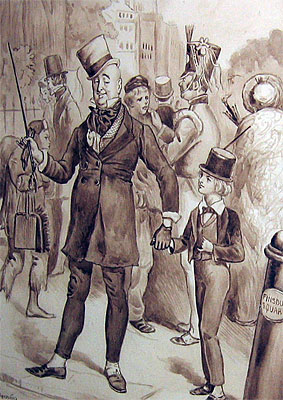
''Mr. Micawber and David Copperfield From David Copperfield Ink and wash drawing by Fred Barnard (1846-1896)''
The uneasy relations between class and virtue comes to the fore, as an edifice that must be maintained at all costs. The vulnerability of Blankfein is his obvious efforts to protect his status and newly minted social prestige; a child of the lower middle-class like Madoff who essentially has learned the tricks of a sullying trade. He resembles Charles Dickens anxiously protecting his title as ”young gentleman” and spurning the compassion of co-worker Bob Fagin in the blacking factory he was forced to work in as a twelve year old after his father, John, was sent to debtor’s prison. ” but Dickens would recall ‘the secret agony of my soul as I sunk into this companionship’, and there is no little ingratitude in the liberty he takes by using the name for his wickedest villain”.( Philip Horne )
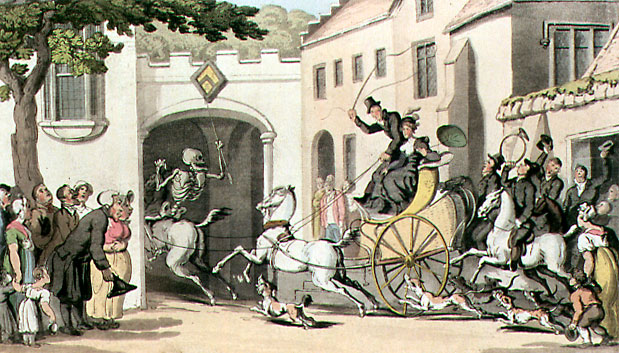
Thomas Rowlandson. Tis Not the Time to Meet One’s Fate, Just Ent’ring on a Large Estate. For The English Dance of Death, by William Combe. Hand colored etching and aquatint, 1816. Published by Rudolph Ackermann, at R. Ackermann’s Repository of Arts, London.
Blankfein, like Dickens, seems to embody the same visceral fear of poverty and pathological trauma of being inured into the self-perceived hopeless routine of wage slave. Yet, he remains a hired gun and replaceable. As John Bayley wrote about Dickens, ” No wonder Fagin the criminal is such an ambivalent figure when the real Fagin’s kindness had, so to speak, threatened to inure Dickens to the hopeless routine of wage slave” The exchanges between Blankfein and Levin, McCaskill and others are really what John Carey would term ”hymns to the purity of the middle class soul” .
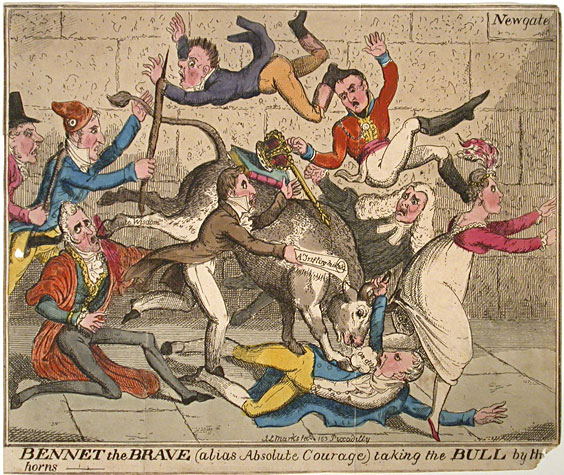
J. L. Marks (English, fl. c.1800-1830). BENNET the BRAVE (Alias Absolute Courage) Taking the BULL by the Horns. Handcolored etching, c. 1820. Sir F. Burdett is depicted chasing a bull in the Newgate Prison as it tramples Henry Gray Bennet and kicks Matthew Wood in the mouth.
7:47pm – Mr Tester on synthetic CDOs, “I think this is just playing around”. He goes on to say that he thinks Mr Blankfein is a smart guy who he’d like to collaborate with on financial reform. Mr Blankfein takes it further, arguing that if the end of the day, financial instruments are too complicated and risky, they may be something that should not be permitted.“Clearly, the world needs more regulation,” Mr Blankfein said.
7:09pm – Sticking to his argument, Mr Blankfein said that those investors who bought the CDO’s wanted those exposures. Ms McCaskill said that such behaviour was undeserving of taxpayer bailouts and called Goldman bankers “hamsters in a wheel” looking for compensation.
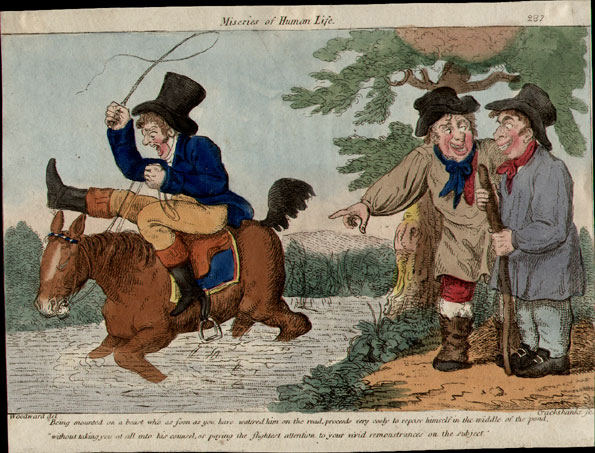
Isaac Cruikshank. ''To the left is a gent trying to get his horse across the river. To the right two amused locals point at the spectacle. The script underneath says. “Being mounted on a beast who as soon as you have watered him on the road, proceeds very cooly to repose himself in the middle of the pond, without taking you at all into his counsel or paying the slightest attention to your vivid remonstrances on the subject”.
7:06pm – “That seems weird,” Ms McCaskill said of Paulson being in the room when the CDOs were structured. “It’s like you’re gambling on the game you’re playing. Not of that seems like even Steven.”
7:01pm – Ms McCaskill questions the market making notion and wonders if there is anything that Goldman Sachs would not make a market for. She’s back to calling synthetic CDO’s sport. Mr Blankfein defends the idea of betting against the housing market, like Paulson did, comparing it to betting against the corn market. “It’s perfectly socially acceptible,” Mr Blankfein said.
ny futures contract on oil or any futures market, you could characterise it as a bet.”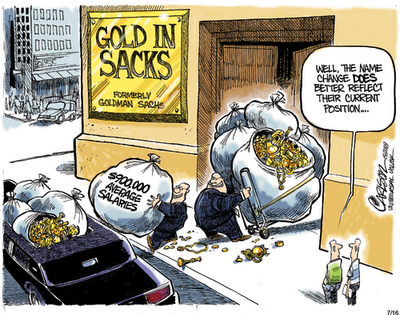
''As if billions in cash and government guarantees wasn't enough, it turns out investment bank Goldman Sachs will also be sucking on the taxpayers' teat when employees move into their slick new digs at the corner of West and Vesey in Manhattan next year. The New Goldman Sachs World Headquarters -- a 43-story office tower next to the World Trade Center site -- is being built with the help of millions of dollars from taxpayers, Bloomberg news service reports.''
Like the childhood of Dickens, Blankfein is a man, on the evidence of what we see, that likely since infant-hood, has tended towards being amusing towards an audience; of being comical and jaunty; surrounded by an atmosphere of perpetual applause and being both quick and glib at witty repartee. And man made to step into the glare of public attention and by his statements, unlikely and unwilling to leave until pushed out, and clearly unwilling to acknowledge personal failing deeper than the most superficial level.
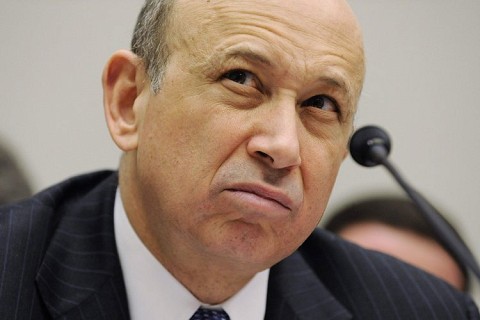
''CNBC's Charlie Gasparino reports in the Daily Beast that Blankfein is "obsessed" with the hits that Goldman's image has taken after getting a $10 billion capital injection from taxpayers and $13 billion out of the AIG bailout. He's "looks like shit" because he's so worried about what's going to happen in bonus season, when he has to distribute that $11 billion bonus reserve. He's looking for a "brand manager" to rescue the firm's image, and Goldman insiders say that anyone who's royally pissed off that Goldman is simply harvesting taxpayer money as profits and handing it out to its obscenely wealthy (and occasionally pedophilic) employees in the form of bonuses really just hates Jews;''
G.K. Chesterton’s perceptive description of Dickens bears and reveals much of what could be termed the ”Fagin paradox” :”But there did mingle with his merits all his life this theatrical quality, this atmosphere of being shown off — a sort of hilarious self-consciousness. His literary life was a triumphal procession; he died drunken with glory. And behind all this nine years’ wonder that filled the world, behind his gigantic tours and his ten thousand editions, the crowded lectures and the crashing brass, behind all the thing we really see is the flushed face of a little boy singing music-hall songs to a circle of aunts and uncles. And this precocious pleasure explains much, too, in the moral way. Dickens had all his life the faults of the little boy who is kept up too late at night. The boy in such a case exhibits a psychological paradox; he is a little too irritable because he is a little too happy. Dickens was always a little too irritable because he was a little too happy. Like the overwrought child in society, he was splendidly sociable, and yet suddenly quarrelsome. In all the practical relations of his life he was what the child is in the last hours of an evening party, genuinely delighted, genuinely delightful, genuinely affectionate and happy, and yet in some strange way fundamentally exasperated and dangerously close to tears.”
Of course, this post and perhaps post-post modern world is far removed from the vestiges and remnants of the puritan ethic that Dickens would occasionally have to preoccupy himself with. Today, there is no real spiritual anxiety to deal with, save the odd cleric attributing natural disasters to a lock of morals. it has been replaced by the equally phantom fear that the financial system will be the Biblical metaphor for armageddon and Blankfeins quip about ”God’s work” only hastening the advent of the messiah. After all, somebody is going to have to clean up the mess. The anxieties have simply shifted resting places from communism, nuclear holocaust and the cold war to Bosch like horrors of financial meltdowns leaving the middle class singing folk songs on street corners and passing tin cups for pittance. There can be no real revolutionary seething; Goldman-Sachs and a few other large players represent an important component of pension plans that will filter down to all levels of society. Adam Smith’s unseen hand of capitalism ensures we all want to drink from the golden calf, but to make it viable there has to be poverty and in the best American tradition there by extension has to be a ”war on poverty”.

lloyd Blankfein. ''Goldman Sachs was founded in 1869 by German immigrant Marcus Goldman, who had worked as a peddler from a horse-drawn cart when he first arrived in New York. His fortunes soon improved, however, and in 1882, Goldman's son-in-law Samuel Sachs joined the firm, which pioneered new business techniques. It joined the New York Stock Exchange in 1896. ''
”He was the man who recently said that the bank did ‘God’s work’ by ‘helping companies to grow by helping them to raise capital [which] allows people to have jobs that create more growth and more wealth. We have a social purpose’.
He also claimed that he personally had ‘attained perfection’. My source at the bank tells me that the divine ambassador was slightly more subdued this week in his message, recorded before the markets opened. ‘It was a circle the wagons pep talk,’ says an analyst at the institution, who would speak to the Mail only in confidence. ‘He calls [these speeches] “mind bullets”. He reminded us of the Goldman way: we are the best, and we always, always put our clients first – which is why we are the best.’





 COMMENTS
COMMENTS